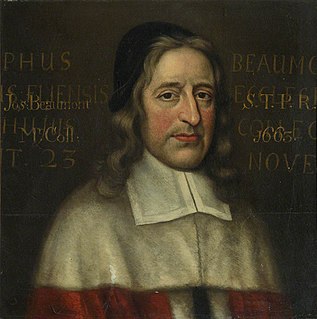Related Research Articles

Ralph Cudworth was an English Anglican clergyman, Christian Hebraist, classicist, theologian and philosopher, and a leading figure among the Cambridge Platonists who became 11th Regius Professor of Hebrew (1645–88), 26th Master of Clare Hall (1645–54), and 14th Master of Christ's College (1654–88). A leading opponent of Hobbes's political and philosophical views, his magnum opus was his The True Intellectual System of the Universe (1678).

John Tillotson was the Anglican Archbishop of Canterbury from 1691 to 1694.

Sir Thomas Stanley was an English author and translator.

Matthew Wren was an influential English clergyman, bishop and scholar.
Christopher Wase was an English scholar, author, translator, and educator, who was the Architypographus of Oxford University Press for several years.

Benjamin Lany was an English academic and bishop.
Laurence Womock (1612–1686) was an English bishop. He is best known for his controversial writings, some of which were signed Tilenus, after Daniel Tilenus, expressing his hostility to Calvinism in general, and the Synod of Dort in particular.

Joseph Beaumont was an English clergyman, academic and poet.
Robert Mapletoft was an English churchman and academic, Master of Pembroke College, Cambridge and Dean of Ely.
Edmund Boldero (1608–1679) was an English royalist clergyman and academic, Master of Jesus College, Cambridge from 1663.

William Stanley (1647–1731) was an English churchman and college head, Master of Corpus Christi College, Cambridge, Archdeacon of London and Dean of St Asaph.
Theophilus Dillingham (1613–1678) was an English churchman and academic, Master of Clare Hall, Cambridge and Archdeacon of Bedford.
Edward Synge
Robert Hindes Groome (1810–1889) was an English Anglican churchman, who became Archdeacon of Suffolk. He wrote several short stories that were set in Suffolk.
Thomas Bainbrigg D.D. (1636–1703), was an English Protestant controversialist.
Thomas Drue or Drewe (c.1586–1627) was an English Protestant playwright.
Thomas Herne was an English academic and lay participant in religious controversy.
Peter Vinke, was an English divine.
Edward Pelling was an English cleric and academic, a significant author in the first generation of High churchmen.
Jerome Beale was Master of Pembroke from 1619 to 1630; and Vice-Chancellor of the University of Cambridge in 1622 to 1623.
References
 This article incorporates text from a publication now in the public domain : "Cressener, Drue". Dictionary of National Biography . London: Smith, Elder & Co. 1885–1900.
This article incorporates text from a publication now in the public domain : "Cressener, Drue". Dictionary of National Biography . London: Smith, Elder & Co. 1885–1900.